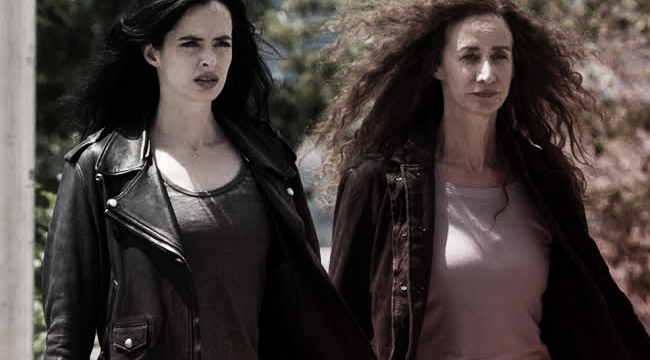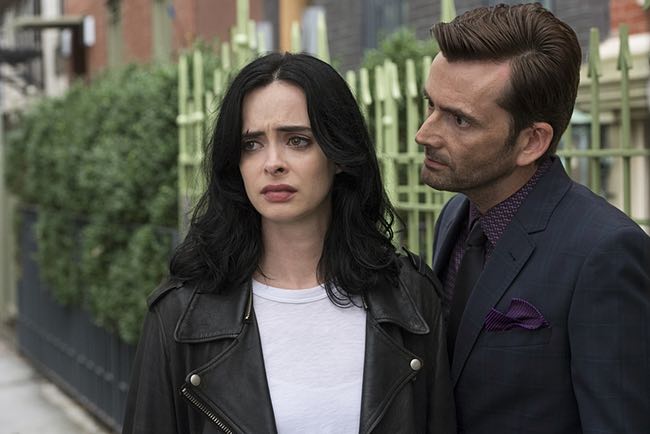
Jessica Jones season two debuted yesterday on Netflix. I found the first five episodes pretty underwhelming, with the usual Netflix/Marvel flabbiness on display, and without the presence of David Tennant as Kilgrave to compensate.
Now I’ve watched the whole season, and I have a lot of additional thoughts on it — starting off with an overall assessment of things for those still on the fence, followed by spoilers galore for those who’ve watched it all — coming up just as soon as I steal you a pony with an annoyingly cute name…
DOES IT GET BETTER?
To my pleasant surprise, this turns out to be the first season of any of these shows to have a stronger second half than a first — albeit within limits.
In time, something is revealed about Janet McTeer’s character that significantly complicates her rivalry with Jessica, and the interaction between McTeer and Krysten Ritter is at times even more interesting than between Ritter and Tennant, because there are many more layers to the thing that links them. The season is still absurdly padded, with nonsensical plot twists to stretch things out, and/or tedious character arcs about the supporting cast, but the Ritter/McTeer scenes cover for an awful lot of it by the end.
(Full season spoilers follow, so bail out now if you haven’t finished, or even started.)
LIKE LOOKING IN A MIRROR
The first few episodes with McTeer suggest she’s playing a botched early experiment by the same people responsible for giving Jessica her powers — a pretty familiar supervillain origin.
At the end of the sixth episode (the first one Netflix didn’t give to critics, no doubt to preserve this twist), she’s instead revealed to be Jessica’s mother Alyssa, who didn’t die in the car accident that killed the rest of the family. The core idea is the same — Alyssa is a less stable, less presentable version of our heroine (which, considering Jessica’s usual behavior… yikes) — but now with the enormous complication that this is the mom Jessica has been grieving for years, and whom she’ll therefore cut an extreme degree of slack.
Jessica’s roller coaster of emotions about her mother (not to be confused with the Ferris wheel on which they spend their final moments together) improves one of season one’s biggest weak spots. Last time out, the trend of “Jessica has finally captured Kilgrave! ZOMG, he got away again!” grew tired very quickly, despite how good Ritter and Tennant were together. There are definitely some contortions this season has to go through to keep Alyssa in play as long as it does, but most of them are driven by character (Jessica changes her mind about turning in her mom) rather than plot (like the support group charging into Jessica’s office and inadvertently setting Kilgrave free), and those tend to be more effective.
More importantly, Alyssa being Jessica’s mother gives vastly more dramatic heft to Jessica’s season-long concern about having executed Kilgrave. The hero — or even the ordinary-ish person — who doesn’t want to think of themselves as a killer isn’t an unreasonable character arc, but the use of it in the season’s early episodes suggested it wasn’t enough on its own to carry 13 episodes. But when you layer recognizable mother/daughter issues on top of that — almost every child worries about inheriting some trait from their parents — then it starts to feel real and powerful in the same way that turning the Jessica/Kilgrave rivalry into a rape survivor story did for season one.
There are plenty of moments where Melissa Rosenberg and company lay the ideas on really thick — Alyssa’s stolen clothes in the last couple of episodes looking straight out of Jessica’s wardrobe, the Jones women getting a chance to rescue a family from a car accident exactly like the one that literally tore apart their family — but on the whole, Jessica reuniting with, and then losing, her mom made the season much more effective emotionally than the early episodes suggested.
Kilgrave did come back — in the only way he should have.

Superhero stories have a long tradition of death being meaningless for pretty much everyone but Spider-Man’s uncle Ben (even Bucky eventually came back). Though Jessica Jones takes place in the same universe as all the Avengers movies, it aspires to a more realistic tone (or a realistic as you can get when super strength and mind control are involved), so bringing Kilgrave back to life after Jessica snapped his neck would undercut an awful lot of what makes the show work and matter. (Alyssa’s resurrection is allowable because her “death” took place long before the show began, and also exhausts the series’ license to bring back the dead.) So the only way for more Kilgrave would be either a flashback to the awful period when he had Jessica under his control (which season one already covered), or doing what the season’s eleventh episode did, and bringing him back as a negative voice in Jessica’s head, tormenting her about the latest terrible decision she’s made.
Making him a figment that Jessica knows is a figment allows the show to dramatize her damaged, self-loathing psyche — and the way the horrors he inflicted on her will never entirely disappear — in a more entertaining way, and also gives the viewer more license to take pleasure in Tennant’s performance and all the nasty dialogue the writers give him, since he’s not really there and Jessica ultimately has full control of the situation: he pops up when she doesn’t want him to, but she’s eventually able to banish him from her thoughts(*). And delaying his entrance until the season’s nearly over prevents him from overshadowing the Jessica/Alyssa relationship too much.
(*) Tennant’s so good, I wouldn’t mind if season three turned into a version of The Leftovers season two, where Kilgrave keeps following Jessica around, no matter what she tries.
HELLCAT, JERI VS LOU GEHRIG, AND THE REST
It’s a good thing Ritter’s performance is as powerful and vulnerable as it is — both in big moments like Jessica realizing she killed the evil prison guard, and smaller ones like Jessica watching Trish get engaged — because she has to do a lot of heavy lifting to cover for how boring and/or contrived large swaths of the show are.
I have no problem with the actors playing Trish, Jeri, or Malcolm, but too many of their scenes suffer from the Dexter problem of existing only to lighten the star’s workload and help fill out a season that’s otherwise light on plot. Jeri being diagnosed with ALS, and then getting hustled by one of the nurses who used to treat Alyssa, could have been excised from the season almost entirely without being noticed. (Foggy Nelson could have just as easily been swapped in for the handful of scenes where Jeri helps move Jessica’s story along, as opposed to his own pointless cameo where Jeri rejected his offer of help with the other partners.) Malcolm and Trish’s various battles with addiction, their attraction to one another, and their raw envy of Jessica, at least tied in more directly to the title character and the Alyssa arc, but couldn’t justify the amount of time spent on either, while also turning Trish in the season’s final third into a gibberish wildcard, who exists only to complicate the plot and keep it moving forward rather than to be a human being with recognizable and well-established motivation.
(Another echo of Dexter season two, which Rosenberg worked on: Trish spares Jessica from having to be the one to kill or otherwise permanently incarcerate Alyssa, which not only takes our heroine off the hook for a tough decision, but renders a lot of her recent indecision pointless. And the idea that the cops would just let Jessica go free, regardless of whether Costa felt Alyssa’s murder was necessary at that point in her rampage, is ridiculous.)
Also, even before Malcolm goes to work for the heinous cartoon villain Pryce Cheng, he utters the line, “I’m so sick of being the only one who is for real around here.” He can go and not come back after that.
CHEKHOV’S DRIVING LESSON?
This is relatively minor in the grand scheme of the season, but all the references to how much Alyssa loves to drive, and how Jessica never drives because of the accident, sure seemed like it was setting up a moment where Jessica would have to get behind the wheel in order to stop her mom. Never happens, though.
SNAPPY COMEBACKS FOR STUPID PEOPLE
There’s a stretch in the middle of the season where it seems like Rosenberg and company have compiled a list of familiar misogynist insults and penned Jones family takedowns of each, like Jessica telling Trish’s drug dealer, “Call me a bitch again. Compare me to a dog, an animal you can kick and collar. Say it again.” Or Alyssa’s indignant reaction to the cab driver’s panties reference: “Grown women don’t wear panties, they wear underwear!” It mostly goes away after that, but I’d like to think there’s a list on the writers’ room wall, and season by season, they’re crossing them off.
OFFICIAL HANDBOOK OF THE MARVEL UNIVERSE
Marvel’s TV shows mostly have to pick through the remainder bin of Marvel characters when they want anyone beyond their main character and their chief villain. Among the Marvel obscurities featured this season:
* There really was a superspeedster called the Whizzer — several in fact, though the current iterations of them go by the less joke-friendly names of Speed Demon and Blur. Our portly conspiracy theorist’s pet mongoose was a nod to the original Whizzer, introduced in USA Comics way back in 1941, whose speed came from a transplant of mongoose blood. (Really.)
* Karl Malus was a bit more benign in this version (or thought of himself that way), but in the comics (usually Captain America), his specialty is either giving powers to would-be supervillains, or enhancing their powers.
* One of Trish’s radio how guests was hypnotist Maynard Tiboldt, better known to comics readers as the villainous Ringmaster, leader of the Circus of Crime. (Really.)
* Trish’s catlike reflexes in preventing her phone from falling down the elevator shaft suggest the show is finally getting around to giving her even more in common with the Patsy Walker from the comics.
What did everybody else think? How did season two compare to the first?
Alan Sepinwall may be reached at sepinwall@uproxx.com. He discusses television weekly on the TV Avalanche podcast. His new book, Breaking Bad 101, is on sale now.
